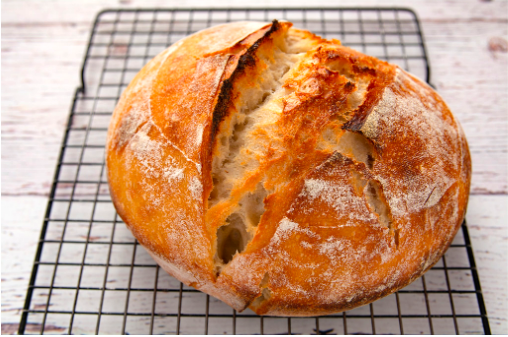
Did you know that the most popular meal in the United States is a simple grilled cheese sandwich? Of the millions of recipes out there, many choose to find comfort in cheese on bread. When you are making yourself a sandwich or eating one for lunch at school, what type of bread do you use? Is it ciabatta, brioche, baguette, rye bread, or white bread? Or, is it sourdough bread?
Sourdough bread isn’t just your ordinary loaf of fibers and wheat. It differs from the very beginning to the very end, as it enters your mouth and you savor that delicious, aromatic flavor. As explained on WebMD, Unlike other breads, “sourdough is naturally leavened bread, which means it doesn’t require yeast to rise.” Normally, bread is made with flour, sugar, and yeast to achieve that puffy, dough-like consistency as the batter. In contrast, sourdough uses a ‘starter’—a fermented mixture of flour and water that includes wild yeast and beneficial bacteria—to make the baked bread rise. The tangy flavor and slightly chewy texture found in sourdough come from this starter. Wild yeast has more flavor than regular commercial yeast and is considered “more natural, as it doesn’t contain any additives,” according to WebMD.
You may be asking, how can such delicious bread be so healthy for you? Well, here is the science behind it. Sourdough is a type of bread that is rich in vitamins, minerals, and nutrients that our bodies can easily absorb. This is due to the interaction between lactic acid bacteria with the bread’s contained nutrients. These bacteria facilitate the release of beneficial nutrients such as folate, magnesium, and potassium, while also breaking down common acids found in other breads. Our biological systems benefit from folate, magnesium, and potassium, as folate is necessary for cell division and DNA production. Magnesium regulates muscle and nerve activity, moderates our protein and blood sugar levels, and assists in bone, protein, and DNA production. Lastly, potassium plays a role in cellular activity–in the monitoring of one’s heartbeat, in the production of proteins, and in the metabolic process of carbs.
Additionally, sourdough’s lactic acid bacteria contribute to the higher levels of antioxidants contained in sourdough bread compared to other varieties of bread. These antioxidants can shield our cells from any potential damage that can lead to deadly diseases such as cancer, heart disease, and even Alzheimer’s disease.
Unlike white bread, sourdough bread may stabilize blood sugar levels. The bacteria not only uniquely affects the starch within the bread, but it is also capable of modifying the structure of the bread molecules, which causes your body to consume them at a slower pace, reducing the sourdough bread, unlike white bread.
bread’s glycemic index (an indication of the rate our bodies convert carbs into glucose from food). As a result, your insulin levels will not greatly elevate after consuming a piece of
Sourdough also manages to have an extremely beneficial effect on our digestive health. In general, it is much easier to digest sourdough than white bread for numerous people. In several case studies, this type of bread acts as a “prebiotic” (unique plant fibers that assist in developing healthy bacteria in one’s gut), which signifies that the healthy bacteria in your intestines are being properly nourished by the fiber located within the bread. These bacteria are vital in preserving a properly functioning digestive system. It has also been concluded that the acid contained in the bread degenerates gluten, which is why sourdough has the lowest amount of gluten compared to other breads. Therefore, if you are a victim of gluten intolerance, sourdough bread is the friendliest bread for your stomach.
Despite its immense health benefits and addicting taste, sourdough bread is unfortunately not for everyone to enjoy. While it is generally a bit lower in gluten content than other breads, sourdough is NOT gluten-free, meaning those with gluten sensitivities may develop symptoms such as rashes, itchy throats, or even difficulty breathing if consumed. However, when compared to other breads with high levels of gluten, sourdough is indeed the best choice. Additionally, due to the ‘starter’ used in sourdough bread, it is more susceptible to contamination or spoiling.
All things considered, sourdough bread is an extremely healthy bread that can do more good than harm throughout many of your biological systems.
So, the next time you enter a grocery store seeking the ever-popular loaf, would you consider sourdough?




















































































































